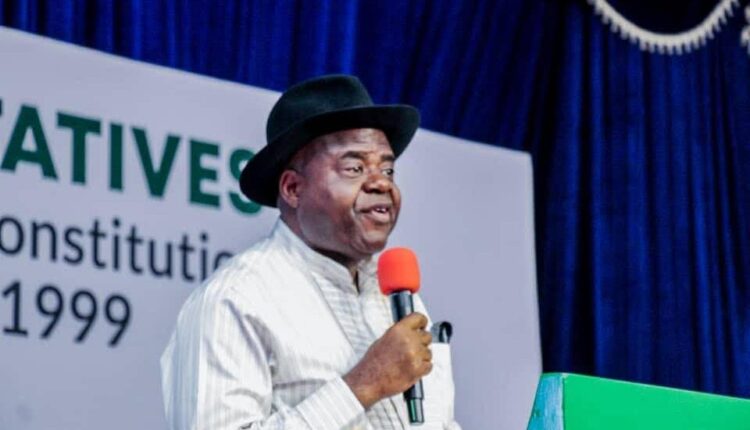In addition to the current eight local government areas, Bayelsa State has requested the establishment of 25 more.
In addition, the state suggested judicial, electoral, and fiscal federalism reforms as well as the creation of a state police force.
At the ongoing public hearing hosted by the South South Centre A (which includes Bayelsa, Delta, and Edo) of the House of Representatives’ Committee on the Review of the 1999 constitution, held on Saturday at the DSP Alamieyeseigha Banquet Hall in Yenagoa, the Attorney General and Commissioner for Justice, Mr. Biriyai Dambo, a Senior Advocate of Nigeria, gave the state’s position.
Mr. Dambo claimed that the state needed to establish additional councils because the existing local government regions were overcrowded, with some having more than 150 communities.
The House of Assembly established the proposed councils in accordance with Section 8(3) of the 1999 Constitution (as modified), and the state argued that it had the financial means to support them.
As part of his proposal to restructure the nation according to the principles of fiscal federalism, Bayelsa proposed that the federal government receive 40% of the tax revenue from the federating states’ onshore and offshore natural resources, while the states would keep 60% of the revenue from their resources.
The state claimed that the establishment of state police would improve states’ ability to combat crime and maintain proper security.
Additionally, it stated that Nigeria was ready for state policing and that the initiative for state police was in line with true federalism.
The state’s stance equally included judicial reforms, electoral reforms to fortify the Independent National Electoral Commission, a review of the exclusive and parliamentary lists, and an examination of the local government system and autonomy.
Senator Douye Diri, the governor of Bayelsa State, stated earlier that the fundamental right of the people to modify the constitution that established their government is the cornerstone of every strong democracy.
According to him, a review of the constitution guarantees that it is a dynamic document that changes to meet the shifting needs and goals of the people rather than a static one.
A strong commitment to the creation of a federal system and structure that was “genuinely just, equitable, responsive, and demonstrably dedicated to the holistic development of not just the state or the Niger Delta region but also the Nigerian federation” was the main component of Bayelsa State’s demands, Governor Diri emphasized.
The people of Bayelsa, he added, wanted “historical injustices related to the inequitable allocation of resources, alongside the glaring disparities in the creation and distribution of local government areas to be corrected.”
Deputy Sir Monday Onyeme represented Delta State Governor Rt. Hon. Sheriff Oborevwori at the occasion, while Attorney General Samson Osagie represented his colleague, Senator Monday Okpebolo.
The constitution review exercise was supported by both governors, who claimed it would fix the present constitution’s shortcomings and close its gaps.
They also pointed out that the 1999 constitution was now a highly contentious text.
Additionally, the South South Center’s chairman Every document submitted would undergo a thorough assessment and be given to the entire Constitution assessment Committee before to being presented on the House floor, according to Prof. Julius Ihonvbere, the majority leader of the House of Representatives and a committee.
Read Also: Saudi Prince Dies After 20 Years in Coma
According to Ihonvbere, the involvement of stakeholders will improve Nigeria and make it more democratic and inclusive, allowing democracy to be more tolerant and participatory.
The event was attended by the deputy governor, Senator Lawrence Ewhrudjakpo, the wife of the Bayelsa governor, Dr. Gloria Diri, state representatives Rodney Ambaiowei (Southern Ijaw), Mrs. Marie Ebikake (Nembe/Brass), Dr. Mitema Obordor (Ogbia), and Dr. Fred Agbedi (Sagbama/Ekeremor Federal Constituency), as well as Speaker of the Bayelsa State House of Assembly, Rt. Hon. Abraham Ingobere, and his Delta State counterpart, Emomotimi Guwor.
King Alfred Diete-Spiff, the head of the state traditional rulers council, King Bubaraye Dakolo, the Amanyanabo of Twon-Brass, and other dignitaries from Bayelsa, Delta, and Edo states were also in attendance.

